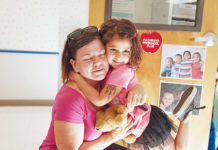
\”Orchid children\” are kids that dislike change, notice subtle smells or emotions, and usually do well on tests but may fail if being watched.
An “orchid child” is one who dislikes change, notices subtle smells or emotions, and usually does well on tests but may fail if being watched.
If you’re the parent of a sensitive child like this, you’ll be pleased to know the right environment can help him or her excel in health and life.
Vulnerable and resilient
Orchid kids make up about 15 to 20 percent of the population. Dr. Tom Boyce, a developmental pediatrician, coined the term to describe kids who have a biological predisposition to react strongly to their environment.
Over the phone from his office at the University of British Columbia, Boyce’s voice conveys the patience and attentive intelligence of someone well suited to work with children.
In his research laboratory Boyce noticed a sub-group of children he later dubbed orchids. “When given challenging tasks to perform,” he says, “changes in the children’s physiology, in their production of the stress hormone cortisol, revealed a dramatically heightened biological reactivity to challenge.”
In one of his studies Boyce followed a group of children who were facing the challenge of attending school for the first time. “The orchid kids who were placed in a classroom with a supportive, encouraging, warm teacher,” he says, “had far fewer respiratory illnesses than the ‘dandelion kids,’ who are less reactive.
“But the orchid kids who were placed in an overcrowded, large classroom with a teacher who didn’t have much time for them, had far more respiratory illnesses than all the other children.
“Orchid kids have either the very worst or the very best outcomes, depending upon the quality of the environments they are in,” Boyce sums up. “So the same child can be both vulnerable and resilient.”
The best and worst of health
Orchid kids who continually experience high stress in difficult environments may develop problems such as depression, hyperactivity, anxiety, and even criminality.
Childhood stress may also induce orchid kids to go through puberty early. As a result, they may face some of the problems associated with early puberty such as teenage pregnancy, eating disorders, substance abuse, and for girls, a 10 to 20 percent higher risk of breast cancer later in life.
In a study by Boyce and Bruce J. Ellis, published in the journal Development and Psychopathology (2011), children were studied from preschool through ninth grade to see if their family environments influenced the onset of puberty.
They found that the orchid kids in stable families with healthy parent-child relationships enjoyed a longer childhood than the other children, starting puberty later and going through it more slowly.
But the orchid children who were raised in families in which there was conflict between parents, and negativity and coercion in parent-child relationships, started puberty sooner and proceeded through it faster.
How the environment gets under our skin
Our stress response system is set when we’re young. Biological changes occur in response to signals from our families and school settings, setting our stress response system high or low for the rest of our lives.
Parenting can also turn on or leave off specific genes.
For example, research has shown that toddlers with high rates of uncooperative and aggressive behaviours are likely to do poorly in school and may become aggressive adults. But if the children carry a variant of a gene called DRD4, and their mothers show sensitivity to their needs, the behaviours drop radically.
Marian Bakermans-Kranenburg, a Dutch professor of child and family studies, reported this result in studies published in Developmental Psychobiology (2006) and Developmental Psychology (2008).
Some of the preschool children in the studies carried DRD4 which, if active, processes dopamine poorly. Dopamine, a brain chemical, is important because it influences mood and learning.
The carriers of DRD4 whose mothers responded promptly, warmly, and consistently to their distress and anxiety, showed far fewer acting-out behaviours than all of the other kids in the studies.
But the carriers whose mothers were not sensitive showed six times the aggressive behaviours as the carriers with responsive moms.
David Dobbs, writing in The Atlantic magazine, speculated that the term orchid could encompass anyone who is a carrier for any of about 12 supposedly “bad” gene variants that are related to health and social problems such as those that some orchid kids face.
Dobbs proposes that these gene variants actually make the carriers much more sensitive to both positive and negative influences.
He dubbed this “the orchid hypothesis.”
What does the orchid hypothesis predict will happen to sensitive children when they become adults?
Adult advantages of high sensitivity
Researcher, doctoral candidate, and author of a new study on highly sensitive adults, Jadzia Jagiellowicz embraces the orchid hypothesis as hopeful.
On the phone from her home in Montreal, she agrees that biological habits are strongly influenced early on. “But as adults,” she asserts, “no matter what our childhood circumstances were, we can take care of ourselves.
“Many highly sensitive people tend to be conscientious and careful about their life habits,” she points out. “They take things more to heart, including information about how to take good care of their health.”
Jagiellowicz’s recent study on highly sensitive people was published in the journal Social Cognitive and Affective Neuroscience (2010). Study participants were asked 27 questions to rate their sensitivity to different kinds of stimuli.
The study indicates there are other advantages to the conscientious, deep-thinking aspects of being highly sensitive.
Using a functional magnetic resonance imaging (fMRI) machine, she was able to image and measure neural activity in the brains of the participants as they looked at sets of two similar photographs and were asked to identify the differences between the two.
The highly sensitive participants showed a lot of activity in an area of the brain that associates incoming visual stimuli with information already in the brain from other senses. They also showed more activation in visual attention areas.
“This tells us that the highly sensitive adults are doing more with the information in front of them,” says Jagiellowicz. “We can extrapolate how this deep-thinking, attention-to-detail trait, affirmed by this study, could be of benefit to individuals and society.”
Highly sensitive adults, for example, might excel in professions that require a high degree of accuracy, such as map making, accounting or, to include the capacity for deep feeling, the arts.
There’s no doubt that sensitivity can sometimes be a curse, but researchers such as Jagiellowicz, Bakermans-Kranenburg, and Boyce are teaching us how to help our children turn it into a gift.
Is your child an orchid?
Your child may be an orchid if he or she:
- is upset by unexpected change
- complains about uncomfortable clothing
- notices the distress of others
- dislikes noisy places
- picks up on subtleties in the environment
- tends to take everything into account before acting
Helping orchid kids bloom
You can help orchid kids blossom spectacularly by providing them with:
- warmth and encouragement
- gentle correction
- regularity, routine, and family ritual
- assistance recognizing which situations are troubling or overwhelming to them and providing the tools to help them cope
- help entering new situations slowly





























